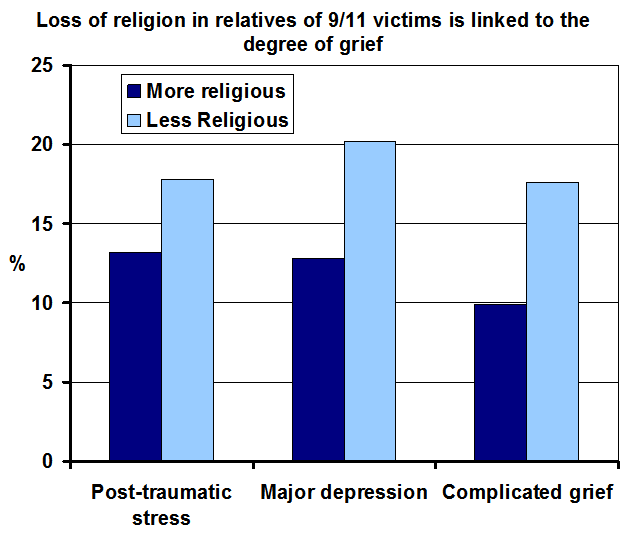Grief has a complicated relationship with Western religion. On the one hand, loss of a loved one can reinforce beliefs. On the other hand, arbitrary or meaningless deaths could feasibly undermine belief.
There hasn’t been much investigation into this topic, which is why a new study of the families of 9/11 victims is particularly interesting. Yuval Neria, a psychiatrist at Columbia University, organised a survey of these families. In all, they got completed questionnaires from 608 9/11 bereaved. Each of these had lost either a child, a spouse, parent, some other relative or a close friend or colleage.
They quizzed them on how important religion was to them before the attack, and also how important it was to them now. They also asked them to fill out questionnaires looking at post-traumatic stress disorder, depression, and something called ‘complicated grief’ – which is a condition “marked by prolonged yearning for the deceased, bitterness, interpersonal disengagement and a sense of meaninglessness”.
Those who lost a child were nearly twice as likely to likely to lose religion than those who lost a different relative or a friend. What’s more, those who watched the attacks live on television were also twice as likely to say that religion was less important to them now.
It seems possible that the severity of the distress is the causal factor here. Indeed, after adjusting for whether the respondent had lost a child or watched the attacks live, they found that those with worse mental distress after the attacks were also twice as likely to report that they had post-traumatic stress, 2.5-times more likely to report that they had major depression, and three times as likely to report that they had complicated grief.
Neria and colleagues conclude that:
“Bereavement from to traumatic loss which commonly entails feelings of purposelessness and futility about the future (Prigerson et al., 1996) may exacerbate the sense of meaninglessness that may underlie the decrease in importance of religion among the bereaved.”
![]()
Seirmarco, G., Neria, Y., Insel, B., Kiper, D., Doruk, A., Gross, R., & Litz, B. (2011). Religiosity and mental health: Changes in religious beliefs, complicated grief, posttraumatic stress disorder, and major depression following the September 11, 2001 attacks. Psychology of Religion and Spirituality DOI: 10.1037/a0023479
 This article by Tom Rees was first published on Epiphenom. It is licensed under Creative Commons.
This article by Tom Rees was first published on Epiphenom. It is licensed under Creative Commons.














